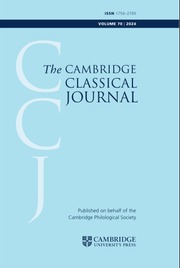Article contents
Combative capping in Aristophanic comedy1
Published online by Cambridge University Press: 28 February 2013
Extract
Beckett's verbal duel is reminiscent of Aristophanic routines between two characters in which the name of the game seems to be to cap the boast, threat or insult hurled by the opposing character. Several recent studies have pointed to the importance of capping to the character and meaning of Aristophanic comedy. Ian Ruffell shows that verbal routines in which a joke is elaborated and capped by another are integral to Aristophanes' comic mode. He has also argued that Old Comedy is partly constituted through a generic requirement that each play deploy an intertextual rhetoric of innovation in which the playwright parades the way in which he has ingeniously capped the plots, routines and conceits of a rival's previous offering. Derek Collins has demonstrated that some of the social and stylistic dynamics of Aristophanic stichomythic and antilabic capping routines have been misunderstood due to a lack of awareness that such routines are part-and-parcel of a wider, cross-generic tradition of performed verse capping. He also shows that this central mode of poetic competition in archaic, classical, Hellenistic and Roman imperial Greece can be usefully illuminated by ethnographic and anthropological comparisons.
- Type
- Research Article
- Information
- Copyright
- Copyright © The Author(s). Published online by Cambridge University Press 2007
References
BIBLIOGRAPHY
- 4
- Cited by


